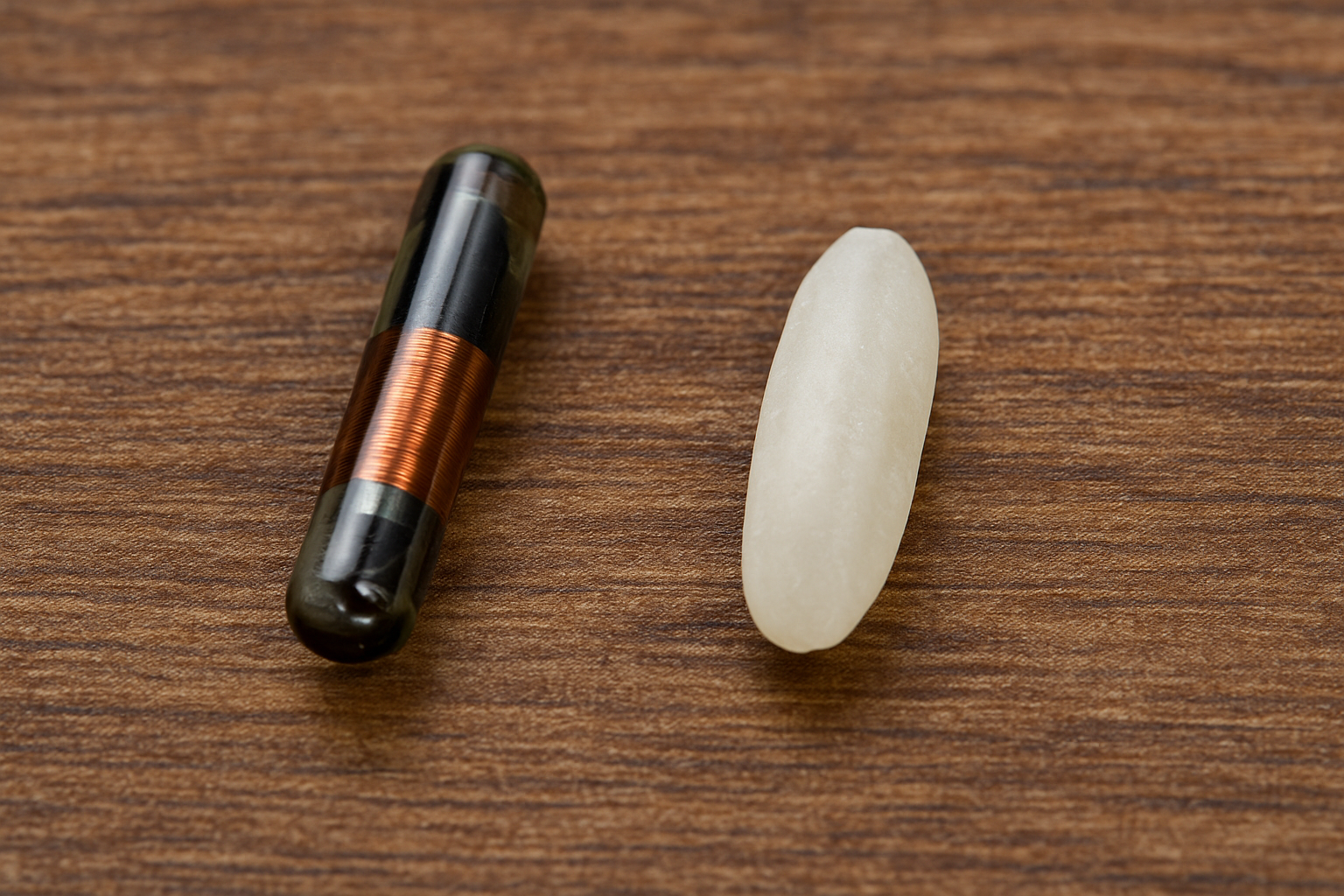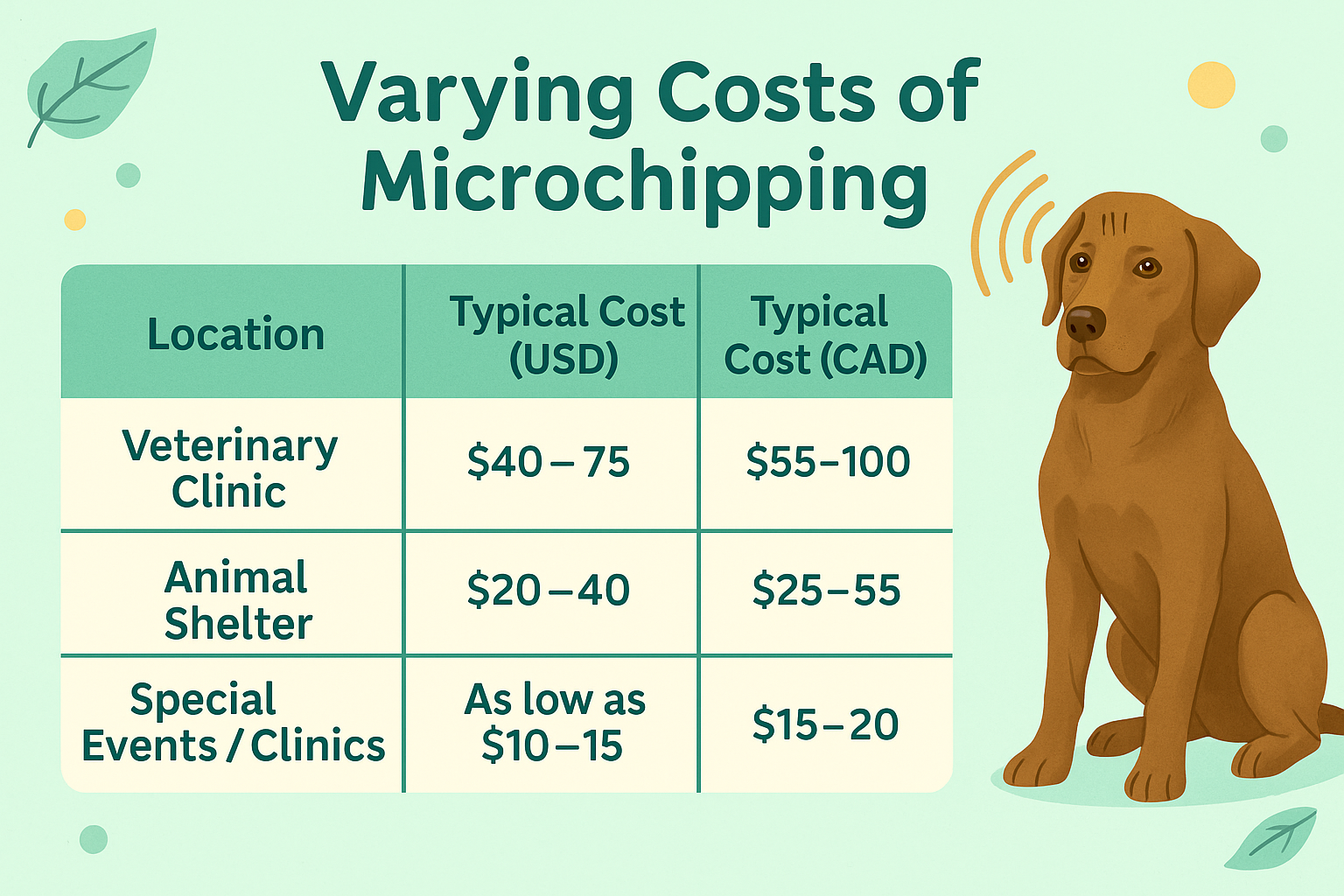The Complete Guide to Microchipping Your Dog: Benefits, Costs & What to Expect
By Ashley MR · 6 minute read
Last updated: August 14th, 2025

Bringing a new dog into your life is exciting—but keeping them safe is a lifelong commitment. One of the most effective ways to protect your furry friend is through microchipping. Whether you’ve adopted a puppy or brought home an older dog, a microchip can make all the difference if your pet ever gets lost.
This guide will walk you through how dog microchips work, how much they cost, popular brands, how to register and maintain your information, and even a bonus section on GPS dog trackers.
How Dog Microchips Work (And Why They’re a Lifesaver for Lost Pets)
A microchip is a tiny device, measuring around 11-14mm in length and 2-2.3mm in width; about the size of a grain of rice. This device is implanted just under your dog’s skin, usually between the shoulder blades. The procedure is quick, safe, and similar to getting a routine vaccination.
Here’s how it works:
Unique ID Number: Each chip has a unique code that’s stored in a secure database.
Scanner Technology: Animal shelters, veterinarians, and animal control officers use a handheld scanner to read the chip.
Owner Information: Once scanned, the unique ID links to your contact details in the registry.
Why it’s so effective: Microchips provide a permanent form of identification that can’t be lost, removed, or damaged like a collar tag. According to the American Veterinary Medical Association (AVMA), dogs with microchips are more than twice as likely to be returned to their owners compared to those without.
Microchipping Costs: What to Expect
Microchipping is one of the most affordable forms of pet protection. Prices can vary depending on your location and veterinary clinic, but here’s a general range:

💡 Mawoo Breeder Tip: Some adoption fees already include microchipping, so check your adoption paperwork before scheduling an appointment.
Popular Microchip Brands for Dogs
While the technology is standardized, certain brands are more widely recognized and have better database support.
HomeAgain – Nationwide coverage in North America, 24/7 recovery service.
Avid – One of the first microchip companies, with a strong international presence.
PetLink – Offers an easy-to-use online portal for updating information.
24PetWatch – Includes extra perks like lost-pet insurance for a limited time.
When choosing a brand, ensure it’s ISO-compliant, meaning it can be read by universal scanners worldwide.
How to Use & Maintain Your Dog’s Microchip
A microchip is only as useful as the information linked to it. Here’s your checklist:
Register Your Information Immediately – Use the microchip ID number provided by your vet or shelter to register with the manufacturer’s database.
Include Multiple Contacts – Add your mobile phone, home phone, and an emergency contact.
Update Whenever Life Changes – Moving? New phone number? Log in and update your details right away.
Annual Check-Ups – Ask your vet to scan the chip during checkups to ensure it’s still readable and in place.
Setting Up Your Personal Information in the Microchip Registry
Find Your Chip Number: This will be on your paperwork from the vet or shelter.
Locate the Manufacturer’s Website: Common sites include HomeAgain.com, PetLink.net, or 24PetWatch.com.
Create an Account: Fill in your name, address, and phone numbers.
Add a Backup Contact: A trusted friend or family member who can be reached if you’re unavailable.
Confirm & Test: Some companies send a confirmation email or may call to verify details.
Dog Microchip Facts & Myths: What Owners Should Really Know
Myth: Microchips work like GPS trackers.
Fact: They only store ID information, not real-time location.
Myth: Microchipping is painful.
Fact: It’s quick and causes minimal discomfort—like a routine shot.
Myth: Microchips can cause health problems.
Fact: Complications are extremely rare; the benefits outweigh the risks.
Myth: Registration happens automatically.
Fact: Owners must actively register and update details for the chip to be effective.
Bonus Section: GPS Dog Trackers – Pros & Cons
While microchips help once your dog is found, GPS trackers help you locate them in real time. Many owners choose to use both for maximum safety. We do not advise you to replace Microchipping with GPS trackers, as trackers are subject to breaking, losing signal or battery, or falling off if your dog is lost for extended periods. Microchips remain present at all times and can more reliably assist with finding your pet once they are recovered.
Popular GPS Dog Tracker Brands:
| Brand | Pros | Cons |
|---|---|---|
| Fi Smart Collar | Long battery life, tracks activity as well as location. | Higher upfront cost; subscription required. |
| Whistle GO Explore | Monitors health metrics, GPS tracking, and activity levels. | Shorter battery life than some competitors. |
| Tractive GPS Dog Tracker | Affordable, lightweight, works worldwide. | Requires subscription; not as rugged as others. |
💡 Pro Tip: GPS trackers are great for adventure dogs, escape artists, or dogs in rural areas where they may roam.
Dog Microchip Facts & Myths: What Owners Should Really Know
FAQ – Microchipping Your Dog
Q: At what age can I microchip my dog?
A: Puppies can be microchipped as early as 6–8 weeks old, but many vets wait until the first vaccination series is complete.
Q: Do I need to replace a microchip?
A: No—most last for 20+ years, longer than your dog’s lifespan.
Q: Can shelters and vets read any brand of microchip?
A: Most modern chips are ISO-compliant and readable by universal scanners.
Q: Does a microchip replace ID tags?
A: No—use both for the best chance of a safe return.
Q: Can I track my dog’s location with a microchip?
A: No—you’ll need a GPS tracker for real-time location tracking.
Conclusion
Microchipping your dog is one of the simplest, most affordable, and most effective ways to protect them. By pairing a registered microchip with an updated ID tag and (if you choose) a GPS tracker, you’re giving your pet the best possible chance of finding their way home if they’re ever lost.
If you’re welcoming a new furry friend, you can browse healthy, well-bred puppies through Mawoo Pets—and ask your breeder or adoption coordinator about microchipping options before your dog comes home.
Related articles
Related puppies for sale
Any questions? Get in touch!
We are here to support you every step of the way. Our concierge service is here daily to answer your questions!
Chat or speak with our team Mon-Sat 9a-9p ET.
